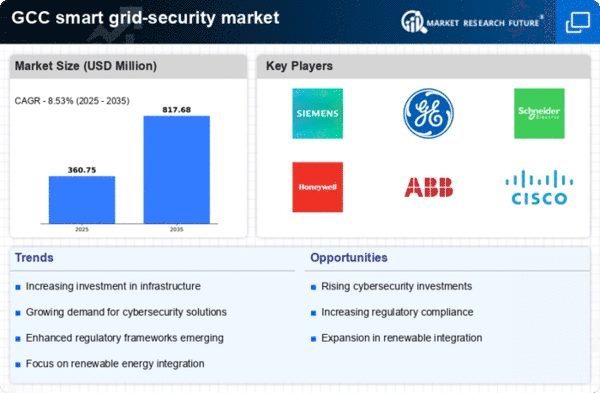Rising Cyber Threats
The increasing frequency and sophistication of cyber threats is a primary driver for the smart grid-security market. In the GCC region, the energy sector has witnessed a surge in cyberattacks, prompting utilities to invest heavily in security measures. Reports indicate that the energy sector is among the top three industries targeted by cybercriminals, with a notable rise in incidents over the past few years. This trend compels stakeholders to adopt advanced cybersecurity solutions to protect critical infrastructure. As a result, the smart grid-security market is expected to grow significantly, with investments projected to reach $1.5 billion by 2026. The urgency to safeguard against potential breaches is likely to drive innovation and the development of more robust security frameworks within the industry.
Increased Public Awareness
Public awareness regarding cybersecurity risks is becoming a significant driver for the smart grid-security market. As consumers become more informed about the implications of cyber threats on energy security, there is growing pressure on utilities to enhance their security measures. In the GCC, public discourse around energy security has intensified, leading to heightened expectations for transparency and accountability from energy providers. This shift in consumer sentiment is prompting utilities to prioritize investments in cybersecurity solutions to maintain public trust. Consequently, the smart grid-security market is likely to benefit from this increased demand for secure energy systems, with projections indicating a potential market size of $1.8 billion by 2028. The interplay between public awareness and security investments is expected to shape the future landscape of the industry.
Technological Advancements
Technological advancements play a pivotal role in shaping the smart grid-security market. The integration of cutting-edge technologies such as artificial intelligence (AI), machine learning, and blockchain is enhancing the security posture of smart grids in the GCC. These technologies enable real-time monitoring and threat detection, allowing utilities to respond swiftly to potential vulnerabilities. For instance, AI-driven analytics can identify unusual patterns in network traffic, indicating possible cyber threats. The adoption of these technologies is expected to increase, with market analysts projecting that the smart grid-security market could reach $2 billion by 2027. This trend suggests that as technology evolves, so too will the strategies employed to secure smart grid infrastructures, ultimately leading to a more resilient energy sector.
Government Initiatives and Policies
Government initiatives aimed at enhancing cybersecurity in the energy sector are crucial for the smart grid-security market. In the GCC, regulatory bodies are increasingly recognizing the importance of securing smart grid infrastructures. Initiatives such as the establishment of national cybersecurity strategies and frameworks are being implemented to guide utilities in adopting best practices. For instance, the UAE has launched a national cybersecurity strategy that emphasizes the protection of critical infrastructure, including energy systems. These policies not only promote investment in security technologies but also foster collaboration among stakeholders. As a result, the smart grid-security market is likely to experience accelerated growth, with an estimated CAGR of 12% over the next five years, driven by these supportive government measures.
Growing Demand for Renewable Energy
The GCC's transition towards renewable energy sources is influencing the smart grid-security market. As countries in the region invest in solar and wind energy, the complexity of managing these resources increases, necessitating enhanced security measures. The integration of distributed energy resources (DERs) into the grid creates new vulnerabilities that must be addressed. Utilities are therefore compelled to implement robust security protocols to protect against potential cyber threats targeting these renewable systems. This shift is expected to drive the smart grid-security market, with estimates suggesting a growth rate of 10% annually as utilities seek to secure their evolving energy landscapes. The focus on renewable energy not only promotes sustainability but also necessitates a reevaluation of security strategies within the industry.
















